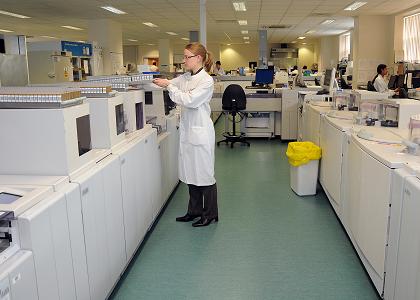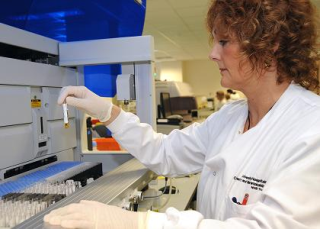 Medical graduates in Clinical Biochemistry have a dual role. They participate in the day‑to‑day management of laboratories that offer a variety of tests that are used in diagnosing and monitoring of disease.
Medical graduates in Clinical Biochemistry have a dual role. They participate in the day‑to‑day management of laboratories that offer a variety of tests that are used in diagnosing and monitoring of disease.
They also have a direct clinical responsibility for the care of patients usually with metabolically related disease that can include patients with hyperlipidaemia (including assessment of cardiovascular risk), diabetes, metabolic bone disease, obesity management, disorders of nutrition including enteral or parenteral nutrition and inherited metabolic disease.
Consultants in this speciality often closely collaborate with other clinical colleagues and dependent on their interests may specialise in research or clinical management. Training is geared towards the sub-speciality of metabolic medicine which is now taken by the majority of registrars in the specialty. Candidates must have the MRCP (UK) diploma but although you need have no prior experience of the clinical or laboratory aspects of this specialty there is an explicit requirement to have an ultimate interest in the science and management of pathology laboratories. Training takes 5 years and leads to a CCT in Chemical Pathology with sub specialty accreditation in Metabolic Medicine.
 Hospitals in the West Midlands region have good exposure to all of the sub speciality requirements for course. In particular there is an attachment of one year in the Children’s Hospital where there is the opportunity to see the specialist chemical and DNA based diagnosis of inborn errors and spend time with the Consultants in metabolic medicine. Trainees spend one year placements in each of the hospital groups.
Hospitals in the West Midlands region have good exposure to all of the sub speciality requirements for course. In particular there is an attachment of one year in the Children’s Hospital where there is the opportunity to see the specialist chemical and DNA based diagnosis of inborn errors and spend time with the Consultants in metabolic medicine. Trainees spend one year placements in each of the hospital groups.
Specific subspecialty skills are dealt with in each of the hospitals and trainees have the opportunity to participate in audit, teaching and research dependent on their progress to FRCPath. The curriculum has been approved by PMETB. Trainees must pass the FRCPath and there is active teaching provided within each of the hospitals in which the trainees are based. An M.Sc. course in Clinical Biochmeistry is offered by the University of Birmingham that provides valuable experience for medical trainees that have had no prior exposure to the subject and is an excellent way of working to achieve the FRCPath exam. At present the course is not reimbursed by the deanery.
There is no on-call commitment for these posts but you should recognise that many of the laboratories work long flexible days and you may need to adopt some flexibility in your commitment to gain full training benefit.